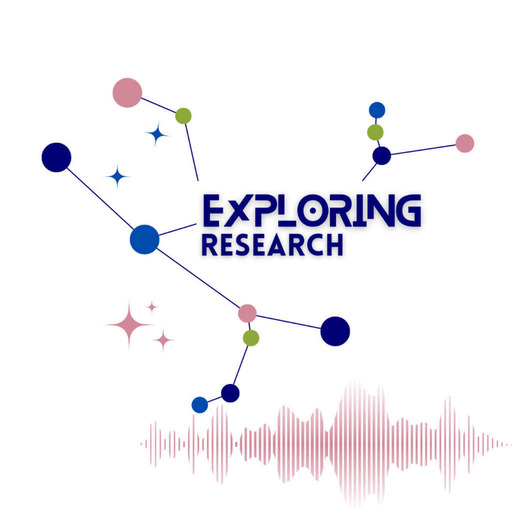[eng] In this episode, you will listen to Dario Strangis, an Italian speech therapist, Certified European Stuttering Specialist, and a person who both stutters and clutters. He presents an article he co-authored with Yvonne Van Zaalen, focusing on a young adolescent who clutters. Dario discusses the importance of taking into account the awareness and concerns of adolescents who clutter, and of monitoring them during pre-adolescence and adolescence to help prevent the development of negative attitudes toward speaking and their impact on daily life. He also explores the interaction between different types of disfluencies in the speech of people who clutter.
References:
van Zaalen, Y., & Strangis, D. (2022). An adolescent confronted with cluttering: The story of Johan. Perspectives of the ASHA Special Interest Groups, 7(5), 1357-1369. https://doi.org/10.1044/2022_PERSP-21-00267
Dario Strangis Instagram : @stuttervoice

Exploring Research
Explorations de la Recherche Scientifique pour la pratique clinique/Exploring Research for Clinical Practice
Christine TOURNIER
Ce podcast vous permet de découvrir les travaux de recherche et les publications utiles pour nourrir votre pratique clinique d'orthophoniste ou de thérapeute. In this podcast, you will find useful information about Research and publications to help you in your clinical practice as a Speech and Language Therapist. Générique/Credits: Musique/Music: Symetrio Voix/Voices: Joeri Van Ormondt, Felicia Pluim, Michelle Swift
Episode 33 [eng]: Susanne Cook about working with teachers of students who clutter to spread the knowledge
[eng] In this episode, you will listen to Dr Susanne Cook, a German Speech-Language Pathologist working in the United States. She is a certified stuttering therapist and Chair of the International Cluttering Association. She presents a study she conducted with 10 high-school teachers to determine what they know about cluttering and the strategies they would use to help their students. The study led to the development of a concise handout for teachers of cluttering students which is available on the ICA website.
Research article: Cook, S. (2025). Supporting teachers of students who clutter: Development of a handout for effective classroom strategies. Journal of Fluency Disorders, 85, 106133. https://doi.org/10.1016/j.jfludis.2025.106133
ICA website: https://sites.google.com/view/icacluttering
Handout for teachers: https://drive.google.com/file/d/1xNfTFNB_xA3walaKFfzPX-3CtOKs15kV/view
French webpage of the Stuttering Association Association Parole Bégaiement with resources about cluttering: https://www.begaiement.org/bredouillement/
[fr] Dans cet épisode, vous entendrez le Dr Susanne Cook, une orthophoniste allemande travaillant aux États-Unis. Elle est thérapeute certifiée en bégaiement et présidente de l'International Cluttering Association. Elle présente une étude qu'elle a menée auprès de dix enseignants du secondaire afin de déterminer ce qu'ils savent du bredouillement et les stratégies qu'ils utiliseraient pour aider leurs élèves. L'étude a conduit à l'élaboration d'un document concis destiné aux enseignants d'élèves qui bredouillent, qui est disponible sur le site de l'ICA.
Episode 32 [fr]: conversation avec Selma Saad Merouwe sur le bégaiement et le bilinguisme
[Fr] Suite au précédent épisode, vous entendrez ici une conversation avec Selma Saad Merouwe qui présente plus en détail son travail de thèse. Orthophoniste au Liban, Selma est certifiée ESS, docteure en sciences sociales et comportementales (option orthophonie) de l'université de Turku (Finlande) et docteure en sciences biologiques et médicales de l'université Saint-Joseph de Beyrouth (Liban). Nous discutons des implications cliniques de son travail de thèse sur les enfants bilingues libanais qui présentent des variations du flux de parole pouvant ressembler à du bégaiement. Nous discutons de la meilleure façon d’accompagner les parents dans leur cheminement, en tenant compte de leurs préférences et de leur contexte.
Saad, S., & Eggers, K. (2024). Speech disfluencies in bilingual children: An inquiry into the differential diagnosis of stuttering (Doctoral dissertation, Ghent University).
Exemples d’études sur des enfants bilingues qui bégaient :
Eggers, K., Van. Eerdenbrugh, S., & Byrd, C.T. (2020a). Speech disfluencies in bilingual Yiddish- Dutch speaking children. Clinical Linguistics Phonetics, 34(6), 576-592.
Ardila, A., Ramos, E., & Barrocas, R. (2011). Patterns of stuttering in a Spanish-English bilingual: A case report. Clinical Linguistics & Phonetics, 25(1), 23-36.
Bakhtiar, M. (2024). Manifestation of speech disfluencies in preschool Cantonese-English speaking bilingual children. Clinical Linguistics & Phonetics, 1-17.
Byrd, C. T., Watson, J., Bedore, L., & Mullis, A. (2015). Identification of stuttering in bilingual Spanish-English speaking children. Contemporary Issues in Communication Science and Disorders, 42, 72-87.
https://www.linkedin.com/in/selma-saad-75943066/
[Eng] Following on from the previous episode, here you'll listen to a conversation with Selma Saad Merouwe who presents her thesis work in greater detail. A speech-language pathologist in Lebanon, Selma is ESS-certified, has a PhD in social and behavioural sciences (speech-language pathology option) from the University of Turku (Finland) and a PhD in biological and medical sciences from the Université Saint-Joseph de Beyrouth (Lebanon). We discuss the clinical implications of her thesis work on Lebanese bilingual children who show variations in speech flow that may resemble stuttering. We discuss how best to accompany parents on their journey, taking into account their preferences and context.
Episode 31 [Eng] : multilingualism and stuttering
[Eng] In this episode, I introduce you to the important concepts to know if you're interested in stuttering in a multilingual context. I present the thesis work of Selma Saad, supervised by Kurt Eggers, on bilingual Lebanese children, which showed that specific assessments must be carried out on bilingual children in the event of stuttering. I'd also like to come back to Paula Sousa Mumy's proposals on the need to value multilingualism and the cultures in which a child who stutters grows up, to foster his or her personal development.
Saad, S., & Eggers, K. (2024). Speech disfluencies in bilingual children: An inquiry into the differential diagnosis of stuttering (Doctoral dissertation, Ghent University).
Souza Mumy, A. P. G. (2023). Culturally responsive guidelines for serving families of bilingual children who stutter. Perspectives of the ASHA Special Interest Groups, 8(1), 164-175.
https://www.linkedin.com/in/selma-saad-75943066/
Episode 31 [Fr]: Multilinguisme et bégaiement
[Fr] Dans cet épisode, je vous présente les concepts importants à connaître si on s’intéresse au bégaiement dans un contexte plurilingue. Je vous présente le travail de thèse de Selma Saad, encadrée par Kurt Eggers, qui porte sur des enfants libanais bilingues et a montré que des évaluations spécifiques doivent être menées chez les enfants bilingues en cas de bégaiement. Je reviens aussi sur les propositions de Paula Sousa Mumy sur la nécessité de valoriser le plurilinguisme et les cultures dans lesquelles un enfant qui bégaie grandit pour favoriser son épanouissement.
Saad, S., & Eggers, K. (2024). Speech disfluencies in bilingual children: An inquiry into the differential diagnosis of stuttering (Doctoral dissertation, Ghent University).
Souza Mumy, A. P. G. (2023). Culturally responsive guidelines for serving families of bilingual children who stutter. Perspectives of the ASHA Special Interest Groups, 8(1), 164-175.
Traduction Clément Aunis-Oumghar : https://fluidite-communication.fr/2024/07/05/recommandations-relatives-a-laccompagnement-des-familles-denfants-bilingues-qui-begaient-dans-le-respect-des-differences-culturelles/
https://www.linkedin.com/in/selma-saad-75943066/



